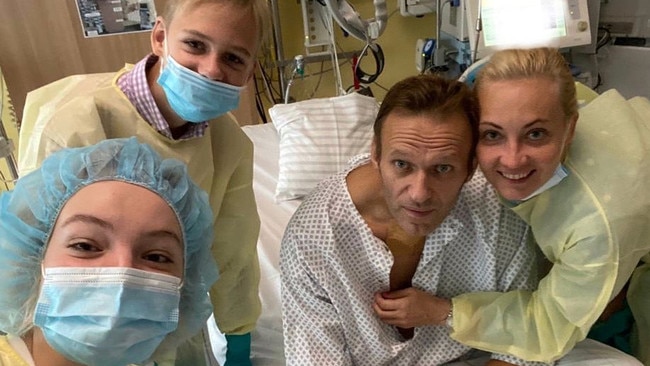Alexei Navalny speaks out from Berlin hospital bed
In an Instagram post that showed him surrounded by his family, Alexei Navalny wrote of his gradual recovery from poisoning.

Alexei Navalny, the Kremlin critic who is believed to have been poisoned with novichok, has made his first comments since emerging last week from a medically induced coma.
Writing in an Instagram post that showed him on a hospital bed surrounded by his wife, Yulia, and their two children, Mr Navalny looked gaunt and appeared to have lost weight.
“Hi, this is Navalny. I can still hardly do anything, but yesterday I was able to breathe on my own all day,” he wrote.
Mr Navalny, 44, lost consciousness on a flight across Russia on August 20. He was flown to Germany two days later after his wife appealed to President Putin. German officials, as well as clinics in France and Sweden, say he was targeted with novichok, a nerve agent developed in the Soviet era that was used to try to kill Sergei Skripal in Salisbury, southwest England, in 2018.
Mr Navalny’s comments came as his closest allies said they were confident he would return to Russia.
“Navalny will want to come back to Russia – he has devoted his whole life to the struggle for the rights of Russian citizens,” said Lyubov Sobol, an anti-corruption lawyer who has worked alongside Navalny for a decade.
“I don’t think that you can be completely safe when abroad. The case of the Skripals illustrates this,” Ms Sobol said. Police are guarding Mr Navalny to prevent another attempt on his life.
Mr Navalny first came to prominence after Russia’s 2011 elections, when he led massive protests against vote-rigging in favour of United Russia, Mr Putin’s ruling party. Although he has described himself as a “liberal kind of guy”, Mr Navalny is a controversial figure for many opposition activists because of his nationalist past. In 2007, Mr Navalny compared illegal immigrants to rotten teeth. He also regularly attended nationalist rallies in Moscow that featured far-right speakers.
Although he has never apologised, his policies have become more left-wing. The only leading politician in Russia to support same-sex marriage and the legalisation of soft drugs, Mr Navalny has also sought to create a strong Russian labour union movement. His focus, however, has been his investigations into alleged corruption by Mr Putin and his inner circle. His online videos detailing kickbacks, bribery and the plundering of state funds by government officials have been watched by tens of millions of people and have sparked nationwide protests.
Kira Yarmysh, Mr Navalny’s spokeswoman, said there was never any question that Mr Navalny would return home to continue his campaign to unseat Mr Putin. “I find it strange anyone could think otherwise,” she said. “No other option has been considered.”
Germany has insisted it will hold Russia responsible for the attack on Mr Navalny unless it proves otherwise. The Kremlin has angrily rejected allegations that its sent agents to kill him.
Sergei Naryshkin, the head of Russia’s SVR foreign intelligence agency, suggested yesterday that Mr Navalny was poisoned in Germany. “When [he] flew out of the territory of the Russian Federation, his body did not contain any toxic substances,” he said.
In another sign of plummeting relations between Berlin and Moscow. Sergei Lavrov, the Russian foreign minister, abruptly cancelled a visit to Germany that was scheduled for Tuesday.
Abbas Gallyamov, a former Kremlin speechwriter who is now a political analyst, said that Mr Navalny’s poisoning would enhance his reputation in the eyes of many Russians: “Archetypically, a leader is one who defeats death.”
The Times



To join the conversation, please log in. Don't have an account? Register
Join the conversation, you are commenting as Logout